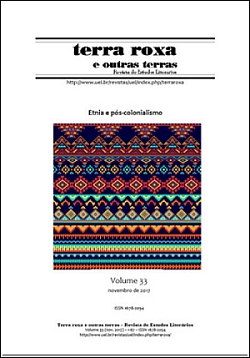Under the weight of their own bodies: representation of the black woman in Conceição Evaristo's short stories "Maria" and "rosa Maria Rosa"
DOI:
https://doi.org/10.5433/1678-2054.2017v33p18Keywords:
Short stories, Conceição Evaristo, Representation, Black womanAbstract
Little attention is given to the female authorship in Brazil, as well as the reduced number of black women characters, mainly as narrators or protagonists. This makes even more important short stories such as "Maria" and "Rosa Maria Rosa" from Conceição Evaristo's short stories books, Olhos d'água (Watery eyes - 2014) and História de leves enganos e parecenças (History of small misleadings and similarities - 2016) respectively. Our objective is to analyze the female character in the short stories mentioned above, with special attention to the weight of their own bodies, that is, as black people and women, in a society still plenty of prejudice and discrimination. We observe that the writer, besides highlighting those individuals in the margins, also problematizes the construction of stereotypes that passed to the nation history, bringing to literature another point of view, and another perspective. The theoretical approaches that support this research are the studies by Ascroft, Griffiths & Tiffin (2007), Chandra Mohanty (2002) and Elizabeth Grosz (2000).Downloads
References
ASHCROFT, B.; GRIFFITHS, G.; TIFFIN, H. Key concepts in post-colonial studies. London and New York: Routledge, 2007.
AZEVEDO, A. O Cortiço. São Paulo: Ática, 1975.
CAZES, L. Conceição Evaristo: a literatura como arte da "escrevivência". Jornal O Globo, Rio de Janeiro, 11 jul. 2016. Cultura, s/p.
Disponível em: <http://oglobo.globo.com/cultura/livros/conceicao-evaristo-literatura-como-arte-da-escrevivencia-19682928#ixzz4M8fKuxea>. Acesso em: 15 jun. 2017.
CHARTIER, R. A história cultural: entre práticas e representações. Tradução Maria Manuela Galhardo. Rio de Janeiro: Bertrand Brasil, 1990.
DALCASTAGNÈ, R. Uma voz ao sol: representação e legitimidade na narrativa brasileira contemporânea. Estudos de Literatura Brasileira Contemporânea, Brasília, n. 20, p. 33-87, jul./ago. 2002. Disponível em: <http://www.gelbc.com.br/pdf_revista/2002.pdf>. Acesso em: 20 jul. 2017.
EVARISTO, C. Da representação à auto-apresentação da Mulher Negra na Literatura Brasileira. Revista Palmares: cultura afro-brasileira, Brasília, ano 1, n. 1, p. 52-57, ago. 2005. Disponível em: <http://www.palmares.gov.br/sites/000/2/download/52%20a%2057.pdf>. Acesso em: 20 jul. 2017.
EVARISTO, C. Histórias de leves enganos e parecenças. Rio de Janeiro: Malê, 2016.
EVARISTO, C. Olhos d'água. Rio de Janeiro: Pallas: Fundação Biblioteca Nacional, 2015.
GROSZ, E. Corpos reconfigurados (Volatile bodies. Toward a corporeal feminism). Tradução Cecilia Holtermann. In: Cadernos Pagu, Campinas, n.14, p. 45-86, 2000.
GUIMARÃES, B. A Escrava Isaura. Rio de Janeiro: Nova Aguillar, 1976.
HARRIS, T. Saints, Sinners, Saviors: Strong Black Women in African American Literature. Nova Iorque: Palgrave Macmillan, 2001.
MOHANTY, C. T. "Under Western Eyes" revisited: Feminist Solidarity through Anticapitalist Struggles. In: Signs: Journal of Women in Culture and Society, University of Chicago Press, v. 28, n.2, p. 499-535, 2002.
SILVA, P. V. B.; ROSEMBERG, F. Brasil: lugares de negros e brancos na mídia. In: VAN DIJK, T. A. Racismo e discurso na América Latina. São Paulo: Contexto, 2012. P.73-115.
WERNECK, J. Introdução. In: EVARISTO, C. Olhos d'água. Rio de Janeiro: Pallas: Fundação Biblioteca Nacional, 2015.
Downloads
Published
How to Cite
Issue
Section
License
Copyright (c) 2017 Terra Roxa e Outras Terras: Revista de Estudos Literários

This work is licensed under a Creative Commons Attribution 4.0 International License.
Authors who publish in this journal agree to the following terms:
a) The authors retain the copyright and grant the journal the right of first publication, the work being simultaneously licensed under the Creative Commons Attribution-NonCommercial 4.0 International License, allowing the sharing of the work with acknowledgment of the authorship of the work and initial publication in this journal.
b) Authors are authorized to assume additional contracts separately, for non-exclusive distribution of the version of the work published in this journal (eg, publish in an institutional repository or as a book chapter), with acknowledgment of authorship and initial publication in this journal.
c) Authors are allowed and encouraged to publish and distribute their work online (e.g. in institutional repositories or on their personal page) after the editorial process, as this can generate productive changes as well as increase impact and citation of the published work (See The Effect of Open Access).
d) The authors of the approved works authorize the journal to, after publication, transfer their content for reproduction in content indexers, virtual libraries and the like.
e) The authors assume that the texts submitted for publication are of their original creation, taking full responsibility for their content in case of any objection by third parties.



















